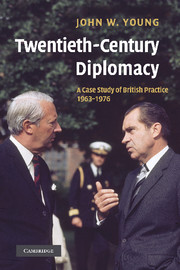Book contents
8 - State visits
Published online by Cambridge University Press: 30 June 2009
Summary
When the Queen of Sheba saw all the wisdom of Solomon and the Palace he had built, the food on his table, the seating of his officials, the attending servants in their robes, his cupbearers and the burnt offerings that he made at the Temple of the Lord, she was overwhelmed.
1 Kings 10.4–5John Dickie, long-serving diplomatic correspondent of the Daily Mail, once wrote that an ‘important aspect of promoting Great Britain PLC which the Foreign Office is reluctant to acknowledge publicly is the way royal visits are fitted into the scheme of things’. Yet, as Solomon's success in impressing the Queen of Sheba shows, royal families have been the focus of diplomatic exchanges from the dawn of history, not least because the real power in many countries down to the modern period was the monarchy. In the early twentieth century, before many European countries shifted to republican systems, royal actions could be significant, even for a constitutional monarchy like Great Britain's. A case in point was the state visit paid by Edward VII to France in 1903, which paved the way for the making of the entente cordiale. Today, monarchs, except in the few cases where they hold executive power, no longer travel abroad to engage in diplomatic negotiations or gather intelligence, but they can have a real impact on diplomatic life.
- Type
- Chapter
- Information
- Twentieth-Century DiplomacyA Case Study of British Practice, 1963–1976, pp. 170 - 197Publisher: Cambridge University PressPrint publication year: 2008



